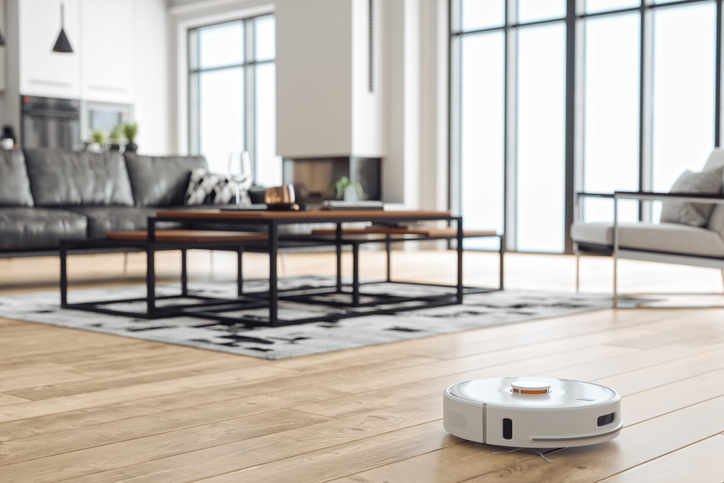- Home
- Symmetry Blog
- Exploring New Devices and Enhanced Interoperability with Matter 1.2
Exploring New Devices and Enhanced Interoperability with Matter 1.2
About Jari Haiston

Designed to streamline connectivity amongst smart home devices through IP technologies, the Matter protocol has evolved into an open standard that delivers secure, convenient, and reliable interoperability in an increasing range of connected devices. In a recent announcement from the Connectivity Standards Alliance, Matter has received a second update, version 1.2, that addresses improvements, revisions, and the significant addition of 9 new device types.
Matter 1.2 Expanding Device Types
The expansion of device compatibility in Matter 1.2 introduces a diverse variety of functionalities across nine new device categories to enhance connected ecosystems’ versatility and reliability.
Matter 1.2 now includes:
- Refrigerators – Elevating beyond mere temperature control, encompassing diverse variants like deep freezers and specialized fridges.
- Room Air Conditioners – Augmenting the existing HVAC repertoire, with dedicated support for standalone room units, complete with temperature and fan control.
- Dishwashers – Incorporating remote start capabilities, progress tracking, and comprehensive alarm coverage for various operational errors.
- Laundry Washers – Introducing cycle notifications, with forthcoming support for dryers in subsequent releases.
- Robotic Vacuums – Enhancing basic functionalities with advanced cleaning modes, status reporting, and performance metrics.
- Smoke & Carbon Monoxide Alarms – Providing comprehensive notifications, audio-visual alerts, and self-testing features for heightened safety.
- Air Quality Sensors – Enabling precise monitoring of various air pollutants and introducing AQI calculations based on location.
- Air Purifiers – Integrating air quality sensing capabilities alongside consumable resource tracking for filter maintenance.
- Fans – Offering nuanced control over movement patterns, airflow direction, and speed adjustments for enhanced comfort.




Previously underserved by other protocols, these device types now find a home within the Matter framework. Manufacturers can now further streamline user experiences by integrating these devices into smart home environments. This growth establishes a robust foundation for future releases, facilitating the development of standardized features applicable across a broad spectrum of appliances.
Elevating User Engagement: Advancements in Matter-Enabled Smart Home Devices
In Matter 1.2, the focus also extends beyond device types to enrich overall user experience during commissioning through more detailed descriptions. For example:
- Door Locks: Descriptions now include specifics like the chrome finish, offering a clearer picture of the device.
- Lamps with Multiple Bulbs: Each bulb now specifies its location or position, simplifying identification for users when bound to a smart switch.
Enhancements Beyond New Features
The update for Matter encompasses more than just new device types. Along with its SDK, testing tools, and certification program, Matter is evolving with the active involvement of hundred of leading smart home engineers and product experts. Their dedication and contributions underscore Matter’s growing momentum and ensures continued enhancements to consumer and developer experiences.
Key improvements include:
- Latch & Bolt Door Locks: Tailored enhancements for European markets, accommodating the common configuration of combined latch and bolt lock units.
- Device Appearance Description: Devices can now describe their color and finish, enabling more accurate representations across various interfaces.
- Device & Endpoint Composition: Hierarchical composition of devices from complex endpoints allows for precise modeling of appliances, multi-unit switches, and multi-light fixtures.
- Semantic Tags: Offers an interoperable method for describing the location and semantic functions of generic Matter clusters and endpoints, ensuring consistent rendering and application across diverse clients.
- Generic Device Operational States: Expresses the various operational modes of a device in a generic manner, facilitating the creation of new device types in future Matter revisions and ensuring basic support across different clients.
Silicon Labs’ Solutions Available at Symmetry Electronics
Since its inception, Silicon Labs has stood at the forefront of supporting the adoption of the Matter protocol. By providing necessary clusters/configurations for both new and established Matter device types, they demonstrate their commitment to smooth integration.
SiLabs’ SiWx917 Wi-Fi® 6 plus Bluetooth ® Low Energy (LE) 5.4 SoCs are their lowest power Wi-Fi 6 solutions. Designed to enable ultra-low power IoT devices, supporting Wi-Fi, Bluetooth, Matter, and IP networking for secure cloud connectivity, SiWx917 SoCs are ideal for battery-operated devices that require prolonged battery life.

.png)
